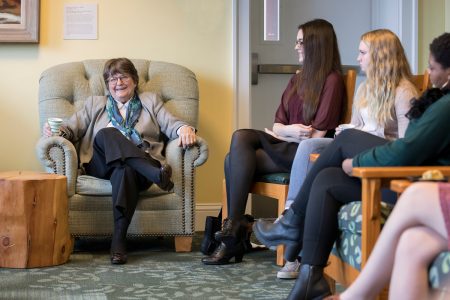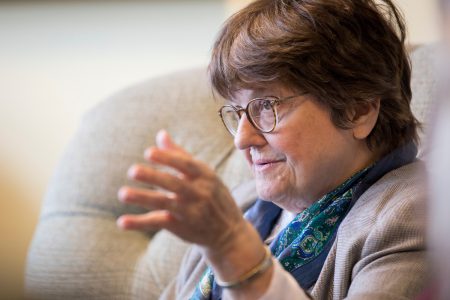Sister Helen Prejean talks death penalty, race relations, and more with Randolph students

Sister Helen Prejean meets with students in the Chandler Student Lounge Tuesday afternoon
Prior to her public lecture at Randolph, one of the leading advocates to abolish the death penalty in the United States had tea and thoughtful discussions with some of the College’s students in the Chandler Student Lounge.
Sister Helen Prejean is a member of the Congregation of St. Joseph, based in New Orleans, La., and has been instrumental in sparking national dialogue on the death penalty and helping to shape the Catholic Church’s newly vigorous opposition to state executions. On Tuesday afternoon, she talked with Randolph philosophy and religious studies students about her work, the history of the nation’s prison system, race, and more. Prejean said she found her calling after the first execution she witnessed in the early 1980s.
“It was just after midnight when they tied him to a wooden chair and pumped electricity through his body and burned him alive,” Prejean recalled. “His killing was a legal act. No religious leaders protested, but I was there and saw it with my own eyes, and what I saw set my soul on fire—a fire that burns in me still.”
Throughout her work with inmates on death row, Prejean has been summoned to court as a special consultant many times. She was even called upon for the trial of Dzhokhar Tsarnaev, who was sentenced to death following his role in the Boston Marathon bombing in 2013. She also discussed how being on death row could be considered a form of torture.
“Torture is described as an extreme mental or physical assault on someone who has been rendered defenseless,” she said. “So think about the mental situation, knowing that you’ve been sentenced to death and you’re left counting down the days. Does that qualify as mental torture? Of course. What could be worse?”
Prejean said many Americans are quick to draw their own conclusions about inmates on death row and the death penalty before knowing all of the facts.
 “Some Americans think it’s much more expensive to put a person in prison than to execute them by just putting a few chemicals in them and knocking them off,” Prejean said. “They have no idea about the whole machinery of death and the system. First of all, you have to have two trials in a death penalty case. One just to find the person guilty enough, and then one just as long to determine the sentence. And then sometimes you have to bring in special personnel. People have no idea. I had no idea and had to find out about how all of that worked.”
“Some Americans think it’s much more expensive to put a person in prison than to execute them by just putting a few chemicals in them and knocking them off,” Prejean said. “They have no idea about the whole machinery of death and the system. First of all, you have to have two trials in a death penalty case. One just to find the person guilty enough, and then one just as long to determine the sentence. And then sometimes you have to bring in special personnel. People have no idea. I had no idea and had to find out about how all of that worked.”
Prejean encouraged students who want to bring about social change for causes they care about. The first step, she said, is to discover their passions.
“You’ve got to try and you’ve got to get involved, and when that fire and that current moves you, you’ll know,” Prejean said. “You can’t make a blueprint and say, ‘Okay, I’m now going out to find my passion.’ You’ve got to open yourself to the possibilities to see which one it’s going to be. And there’s no way you can discover your passion without discovering your community at the same time.”
Prejean will present her free, public lecture at Randolph College tonight at 7:30 p.m. in Houston Memorial Chapel. A book signing will follow the lecture.
Tags: comparative philosophy, events, Helen Prejean, philosophy, religious studies, speakers
